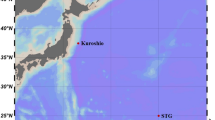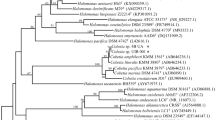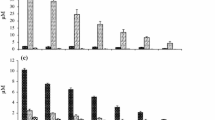Abstract
The survival and persistence of growing and starved cells of Enterococcus faecalis in untreated and differentially filtered (20 μm, 5 μm, 3 μm, 1.2 μm, and 0.1 μm) seawater was analyzed in samples taken at different times over a 1-year period by plate counts and scanning electron microscopy. Whereas seawater filtered through a 0.1-μm mesh was not at all or only slightly bactericidal during incubation at 16°C in the dark, culturability of E. faecalis in the other systems decreased as a function of increasing pore size of the filters. Recovery of culturable, glucose pre-starved cells was always higher than that of cells harvested from the exponential growth phase. Electron microscopic analysis showed that the disappearance of enterococci appeared related to the presence and multiplication of various zooflagellates.
Similar content being viewed by others
Author information
Authors and Affiliations
Additional information
Received: 25 July 2001 / Accepted: 27 August 2001
Rights and permissions
About this article
Cite this article
Hartke, A., Lemarinier, S., Pichereau, V. et al. Survival of Enterococcus faecalis in Seawater Microcosms Is Limited in the Presence of Bacterivorous Zooflagellates. Curr Microbiol 44, 329–335 (2002). https://doi.org/10.1007/s00284-001-0018-4
Issue Date:
DOI: https://doi.org/10.1007/s00284-001-0018-4




